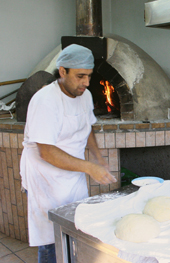In Drakona in the Prefecture of Kerameies, in Chania, Crete
The idea of the Traditional Center of Gastronomy of the Cretan Diet “DOUNIAS” was formulated eight years ago when the owner Mr. Stelios Trilyrakis who was a professional cook then in Chania decided to live in his village and create a place of his own which would revive tastes that he knew from his grandmother and mother in the very place that these women lived.
For such an idea to come to life there are two prerequisites: raw materials should be local products (if this is possible) and the dishes should be produced in a traditional way. Then, a kitchen-workshop was created equipped with chimney-corners, wood stoves, a wood oven and necessary preparation areas always according to food health and safety rules. Under these circumstances, a family business was organized along with a small farm and vegetable groves in fields that were till then disused. Moreover, the traditional family production was exploited regarding wine, olive oil and honey. Furthermore, neighbor cooperation was established, based on supplies which the owner did not have the potential to produce, especially regarding meat and milk.
The Traditional Center of Gastronomy of the Cretan Diet “DOUNIAS” was created in Drakona in the Prefecture of Kerameies. It is a village on the foot of Lefka Ori (White Mountains), located on 600meters altitude, in a magnificent natural and historical environment. The enterprise is situated on the house that belonged to Dounias family (Douniadakis Demetris was the owner’s grandfather), where every passer-by used to taste the splendid wine and special treats.
The company exclusively uses virgin olive oil, in all cooking procedures, which is produced by the family. Olives can be preserved in various ways (crushed olives, pickled olives, salted olives, kolympades) and some kinds can be preserved all year round.
The herbs used for the dishes such as origami for the salads, thyme for grilled meat, sage for lamp with honey, bay leaves for rabbit casserole with onions, along with malotera, dittany, marjoram, pennyroyal and chamomile which are used for beverages, are collected in the village up to the nearest slopes of Lefka Ori.
The animals are bred by the owner himself and his family and provide the milk that staka, skim-milk cheese and yoghurt are produced.
Furthermore, the meat of these animals is used for the production of the traditional pilaf, roasted brown meat, kid meat with herbs, meat pies etc. The family also produces honey which is used to create special dishes and the exquisite rakomelo (raki with honey). An assortment of products that are offered but not produced in the village such as flour, pulses or rice are bought from a cooperative shop of biological products, whose owner is also a member.
An estimation of the present and future according to the owner Mr. Stelios Trilyrakis is that “After trying for so many years we have realized that deciding to create the Traditional Center of Gastronomy of the Cretan Diet was the right choice. Keeping our tradition and the village alive, we contribute economically, culturally and socially to the local community. We provide the joy of taste, knowledge and health to our customers along with the joy of creation within a healthy environment that respects life and ourselves, even though there are a lot to be done, especially regarding the presentation and the activities that can be combined”.
The “Quality Label of the Cretan Cuisine” is awarded to restaurants that offer Cretan dishes and use exclusively virgin Cretan olive oil and local products. It constitutes a landmark of the quality of the services offered in the field of food regarding Cretan Cuisine. It is awarded by the inter-prefectural, civil, non-profit organization “Cretan Quality Label” and constitutes a benefit of competition and a powerful promotion tool for every company.
The “Cretan Quality Label” was awarded as the first “Quality Label of the Cretan Cuisine” to the mass food enterprise “DOUNIAS”, in Drakona in Kerameies, in the prefecture of Chania, since the procedures of certification were successfully completed (inspection, reparative procedures and absolute compliance with the requirements of Certification).
Source of publication 10th edition In-On

